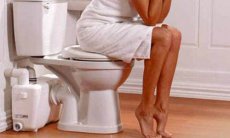Medical expert of the article
New publications
Why women are more likely to suffer from constipation
Last reviewed: 04.07.2025

All iLive content is medically reviewed or fact checked to ensure as much factual accuracy as possible.
We have strict sourcing guidelines and only link to reputable media sites, academic research institutions and, whenever possible, medically peer reviewed studies. Note that the numbers in parentheses ([1], [2], etc.) are clickable links to these studies.
If you feel that any of our content is inaccurate, out-of-date, or otherwise questionable, please select it and press Ctrl + Enter.

As already mentioned, women become victims of constipation more often than men. Women are 3-4 times more likely to develop this disease than men. Why do women suffer from constipation more often?
What are the characteristics of female constipation?
Often, constipation in women can appear at a young age or immediately after childbirth, while men, in turn, face this problem only in adulthood. It turns out that constipation in women can occur not only due to intestinal problems, but also due to a certain constitutional predisposition. What is the problem then?
In some women, with a normal size of intestine and its proper functioning, feces can move slowly, which means that defecation occurs infrequently even in childhood and adolescence. Constipation is often associated with abdominal surgery.
Age - bowel problems
Every year the time interval between bowel movements increases, and already in adulthood a person defecates no more than once a week, and that is thanks to enemas and laxatives. The main signs of constipation are pain in the intestinal area and severe stretching of the abdominal wall.
Very often, the course of this disease becomes too heavy a burden, both from a psychological and physical point of view. After all, the fight against constipation takes up most of a person's free time, and sometimes such a fight leads to nervous disorders. Treatment of such patients becomes an extremely difficult task that can only be solved by a specialist who approaches the problem comprehensively. Not in all cases does treatment lead to a worthy result.
Constipation due to hormonal imbalances
Women who suffer from constipation may also have a certain hormonal imbalance in their body. The consequence of such an imbalance is painful periods that occur without any periodicity. Women with such a problem find it very difficult to endure the initial period of pregnancy.
In this case, tests show problems with the sex glands. The blood may contain too much of the hormone prolactin, which is responsible for the formation of breast milk, and the content of female hormones estrogen and estradiol may decrease. If this is the case, then constipation treatment should be combined with a visit to the gynecologist.


 [
[